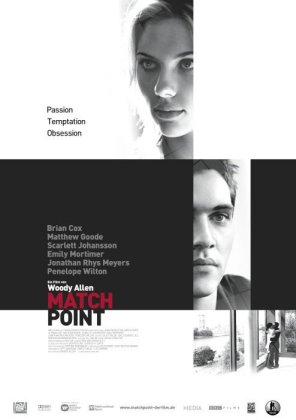|
Match
Point
In
1977, both Woody Allen’s Annie Hall and George
Lucas’ Star Wars were nominated for Academy
Awards for Best Picture, Director, and Writing, Screenplay
Written Directly for the Screen. Both films were enormous
departures for each director, reinventing not only their
own individual careers, but redefining the intellectualized
romantic comedy and sci-fi space opera genres respectively.
Annie Hall, as history would have it, went on to
trounce Lucas’ first installment in the Star Wars
franchise, and as fate would have it, thirty-some years
later, each director has come to represent a pale shadow
of their once regaled greatness.
Like
Lucas’ mediocre prequels, Allen’s more recent
efforts have fallen somewhat short of the brilliance that
Woody went on to unleash following Annie Hall.
Films like Manhattan, Purple Rose of Cairo, Hannah and
her Sisters, Crimes and Misdemeanors and Husbands
and Wives defined the writer-director-comedian-musician’s
versatility and unique voice.
This
isn’t to say that his current crop of entries haven’t
been interesting in their own regard, as any Woody Allen
film usually tends to invite something to chew upon, its
just that these recent efforts have seemingly failed to
gel, never fully ripening into something special or defining.
Until
now.
With
Match Point, it would seem that the de-fanged and
de-clawed Woody of old has all but disappeared, and as much
as this sounds like some twisted euphemism, it means exactly
what is implied. From the very opening frame, Match
Point looks and feels like the sort of film you would
find spilling forth from a helmer with a distinct and clear
vision in place. There is a plan of attack at work here,
and Woody pounces on his audiences with all the austerity
of a young caged tiger, eager to get back into the hunt.
Allen's
former deal with Dreamworks Pictures is the stuff of saddened
legend. Having been offered a three picture deal, initially,
Woody’s first three efforts under the studio banner
seemed to retrograde from the caper-turned-on-its-ear comedy
of Small Time Crooks, to the troubled Curse of
the Jade Scorpion, and finally culminating in the contemplative
Hollywood Ending.
Looking
back, Ending was probably more sub-textually rooted
in Allen’s state of mind than anyone could have foreseen,
and the fresh yet anchored Anything Else seemed
to point more in this direction.
Interjecting
two “Woody” characters into the film, a younger
version of himself played by Jason Biggs and an older and
degraded version played by Allen himself, Woody seemed to
be carrying on a discussion with himself, contemplating
his next move in a “what if I could warn my younger
self” sort of scenario. The film ultimately closes
with Biggs’ Allen leaving America to start anew in
France, where he is bound to find an audience who understands
his work.
Flash-forward
to Match Point, Allen’s first film shot entirely
in London, and what you find is a film that seems to have
taken note from the director’s contemplative dalliances
with comedy and drama, as explored in Melinda and Melinda,
and ultimately falls on the other side of the fence once
more, with a dramatic entry with smatterings of both crime
and comedy to keep viewers on their toes.
The
film centers on former professional tennis player Chris
Wilton (Jonathan Rhys-Meyers), eager to make a change in
his life by doing something more worthwhile, he finds himself
teaching tennis at a country club when he befriends Tom
Hewett (Matthew Goode) over lessons. Tom is the son of rich
and successful businessman Alec (Brian Cox) and brother
to Chloe (Emily Mortimer), who becomes instantly taken with
Chris.
Chloe
and Chris become fast friends while taking in films, theater,
and art exhibits around town. However, Chris finds himself
in somewhat of a bind when he meets a sultry and alluring
American actress named Nola Rice (Scarlett Johansson) at
a Hewett family houseparty and sparks instantly ignite between
the two flirtatious characters.
As fate
would have it, Nola is engaged to Tom, which means she is
off limits, and aside from this factoid, it would seem that
Chloe’s love of Chris has prompted her to urge her
father to take him under his wing, grooming him to become
a predator of the ludicrous business arena.
If you
think you know where this is headed, chances are you are
off by a step, because Allen never plays things as they
seem. His work is subtle, and the twists and turns these
characters find themselves navigating are never forced,
trite, or contrived. We follow their motives, and we fully
understand what drives Chris, Chloe, and Nola as their lives
intertwine in and out of bed.
What
emerges is not simply a sordid affair or a thriller with
thematic betrayal and double-crosses, but instead a cunning
dissection of class, wealth, and stature. Allen honestly
lays out a set of tools for each character to employ in
their attempts to grasp at their individual perceptions
of success, happiness, and complacency, and we watch each
one delicately go to work at struggling to achieve their
individual dreams. Throughout all of this, the entire film
remains delicately tethered to the simple metaphor laid
out in the opening scene by Chris himself:
“There
are moments in a match when the ball hits the top of the
net and for a split second it can either go forward or fall
back. With a little luck it goes forward and you win. Or
maybe it doesn't and you lose.”
Whether
Match Point is a result of luck remains unknown,
but its brilliant yet contemplative outcome proves that
a once thought to be diminished director like Woody Allen
can dig deep and manage to scratch out a considerable win
in the process.
Rating: 
|








